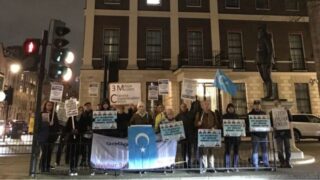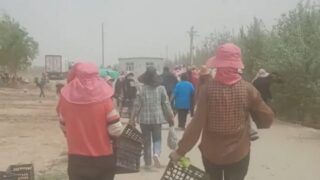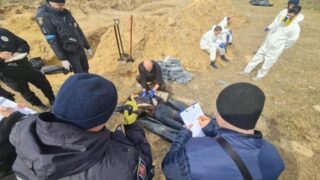A conference in Turin, Italy, was a precedent of international value, setting a model of scholarship and advocacy that should be replicated world-wide.
by Marco Respinti


A clear example of how a local conference can rise to international status, combining scholarship, advocacy and testimonies in the most serious way. This was the conference hosted in Turin, Italy, on September 27, 2023, under the title “Human Rights in Afghanistan, with a Particular Focus on the Hazara Genocide” by the Piedmont (Italy) Regional Council, the Municipality of Turin (Italy), International Help, the Cultural Association of Afghans in Italy (ACAFI), and others, in which this writer also participated as a speaker.
It was an example for many reasons, but five of them may be sufficient to illustrate the point. First, of course, the subject. Afghanistan is a topic that concerns the entire world. Religious liberty and human rights are systematically and chronically violated there, and no one can remain indifferent. In the case of Afghanistan, indifference is in fact not allowed, not only out of compassion, but also for geo-strategical reason. For vocation and choice, “Bitter Winter” never enters the political sphere per se. Nonetheless, it does not renounce to underline all those daring circumstances when politics and policies do abuse the sphere of religious liberty and human rights. Not only “Bitter Winter,” but all people in good faith cannot refrain from judging the Taliban intermingling of faith and politics a serious question, as well as regarding as inconsiderate the all-too-hurried US military withdrawal from the country, whatever one may think of the war in Afghanistan.
Secondly, a conference that brings together a considerable number of speakers from different backgrounds and areas of specialization to focus on a people whose physical survival is under attack within the larger framework of the Afghan situation cannot be considered an event of mere local interest.
Finally—and this counts for the remaining three reasons—three specific speeches, out of several high-quality contributions offered that day, confirmed the international dimension of the event.
Professor Ottavio Quirico, who teaches in the areas of international law and relations as well as EU law and policy at the Università per Stranieri in Perugia, Italy, carefully examined and explained the language used in the “Convention on the Prevention and Punishment of the Crime of Genocide,” that was adopted in 1948 by the United Nations, to see its possible application to the Hazara case. Quoting it directly, he concluded that Hazaras in Afghanistan are facing a real genocide: “In the present Convention,” he read and commented from the text, “genocide means any of the following acts committed with intent to destroy, in whole or in part, a national, ethnical, racial or religious group, as such: (a) Killing members of the group; (b) Causing serious bodily or mental harm to members of the group; (c) Deliberately inflicting on the group conditions of life calculated to bring about its physical destruction in whole or in part; (d) Imposing measures intended to prevent births within the group; (e) Forcibly transferring children of the group to another group.”


Important in itself, his speech contained yet another crucial element that should be discussed further and indeed constitutes the future of prevention of genocide. It is the question of “cultural genocide.” “Bitter Winter” always underlined its importance and sensitivity, as well as its somewhat elusive nature. A cultural genocide is basically the killing of the future of a human group, aimed at and possibly achieved through both the impediment to pass one group’s cultural identity (made of language, costumes, religion, etc.) from one generation to another, and obstacles posed to its physical reproduction. Sometimes less visible that an immediate physical massacre, and more diluted in time, it is not included in the legal international requirements that define a genocide, but scholars and experts are discussing it. Quirico publicly sided with those who regard these practices as genocidal, wondering and weighting the opportunity of an enlargement of the classic definition of genocide, thus offering an important contribution to one of the most decisive debates on the subject.
Claudio Concas, a Ph.D. candidate in the Università degli Studi Bicocca in Milan, put the Hazara sacrifice in an historical perspective, but the most important contribution of his presence at the conference was introducing his book in Italian whose title may be translated as “Voices from Hazaristan: History of the Hazara People amid Discrimination, Social Marginalization, and Ethnic Massacres.” It is in fact the only book in Italian on the subject, but also one of the very few in any Western language, and for sure the most updated and timely at an international level. It is an example of Italian excellence that deserves to be translated in English and known universally.


Last but not the least, two Afghan authors presented and discussed an important research report, “We Will Make Pakistan Their Graveyard: Systematic Attacks Against Shia Hazaras of Quetta, Pakistan (1999-2022),” published by the Porsesh Policy Research Institute in Seatac, Washington. Its importance rests on the fact that it enlarges the vision beyond Afghanistan, offering a perspective on the fate of the Hazaras in Pakistan, a country that for many reasons, while differing from Afghanistan, shares the same fanaticism, intolerance, and political use of religion to discriminate and persecute.
The authors of the report are Bismellah Alizada, Ph.D. candidate at SOAS University in London and formerly Deputy Director of the Organization for Policy Research and Development Studies in Afghanistan, and Maisam Iltaf. The latter is a researcher and human rights activist, and a member of Amnesty International. He was the co-founder of the now defunct Rahila Foundation in Kabul, Afghanistan, which promoted free education. The foundation was named after Rahila Monji, killed at age 17 as one of some forty victims of the August 15, 2018, suicide attack perpetrated by the Islamic State in a Hazara neighborhood of Kabul. Young Rhaila was a cousin of Iltaf.
The precedent set by the Turin conference is important. Its model should be replicated internationally. The Hazaras deserve it.









